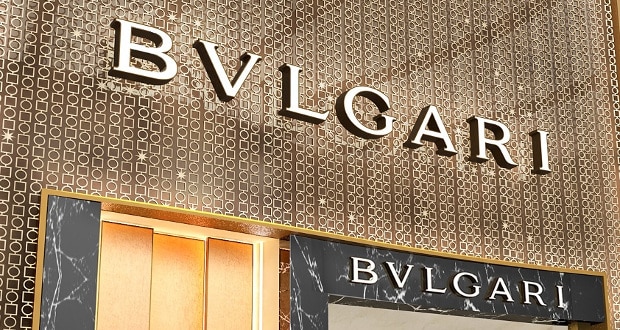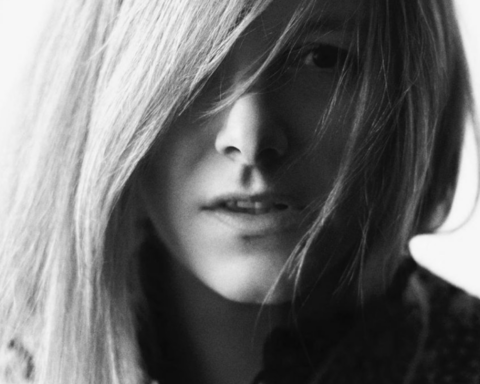[vc_row njt-role=”people-in-the-roles” njt-role-user-roles=”administrator,editor,author,armember”][vc_column][vc_column_text]
The Italian jeweler incurred the wrath of Chinese internet users after mentioning Taiwan as an independent country rather than a region of China on its official website.
The LVMH Group brand is the latest luxury brand to depart from the ‘One China’ policy, thereby exposing itself to the risk of a boycott of its products. Beijing and the people of mainland China are particularly adamant about this concept.
In addition to the island of Taiwan, considering cities such as Hong Kong and Macao to be outside China has been the source of much controversy for luxury brands in the past.
A “humiliation” for China
It all started in the last few days with a screenshot taken from the official Bulgari website, which was quickly shared en masse on Chinese social networks.
On the page showing the location of the jewellery brand’s boutiques in Asia, Taiwan is presented as an independent country, a departure from the vision of the central power in Beijing, which prefers to see it as a ‘breakaway’ province belonging to the People’s Republic of China.
So while Hong Kong and Macau are listed in Beijing’s sense of the term, as “Macau, China” and “Hong Kong, China” respectively, Taiwan is listed without the word “China”.
To make matters worse, Taiwan and China have also been designated by a similar font size on a map on the website, leaving no doubt as to the deliberate nature of the reference.
The situation comes as a surprise, given that most luxury brands generally prefer to follow the vision defended by the central government, adapting the layout of their shops to the Chinese version of their websites at the same time.
However, as the marketing agency specializing in brand development in the Middle Kingdom, Dao Insights, suggests, such a blunder could have been avoided “with the font size by labeling only the cities on the island (for example, Taipei with the same font size as Fuzhou), rather than labeling the country as a whole.”

Under pressure to be self-critical, Bulgari, owned by luxury conglomerate LVMH, apologized on its official Weibo account on Tuesday 11 July.
The jeweler stated that the error was due to managerial negligence and that it “respects China’s position on sovereignty and territorial integrity, as always and unwaveringly“.
However, this statement was not enough to quell the outrage, as two related hashtags – one of which has already been viewed 800 million times – appear in the top 10 trending topics on Weibo, China’s Twitter with 593 millions monthly active users (June 2023).
“Next time, don’t make mistakes at such a low level” commented a furious Chinese Internet user below a House publication.
The American media outlet CNN noted, however, that certain state media had provoked an escalation in the outraged reactions of Internet users. The Global Times claimed that Bulgari’s apology was “not accepted by many in China”.
A spokesperson for the Communist Party, People’s Daily, wondered why the brand had not published similar statements in English on its Twitter and Instagram accounts.

Some social media users were quick to urge Bulgari’s celebrity ambassadors – including Taiwanese actresses Liu Yifei and Shu Qi, and model Liu Wen – to make statements or sever their ties with the brand.
This situation is all the more surprising given that there are precedents in the luxury goods industry.
On 11 August 2019, for example, Versace had to apologize for a message T-shirt in the form of fictitious tour dates that appeared to refer to Hong Kong and Macau as countries, not cities.

Designer Donatella Versace apologised on her official Instagram account, regretting “an unfortunate labeling error” and saying she would consider “actions to improve the way we operate on a day-to-day basis”. The brand also stated that it had removed and destroyed the offending T-shirts.
The following day, Coach and the Givenchy brand (LVMH) were forced to do the same after social network users discovered similar designs that also failed to identify Hong Kong as part of China, while implying Taiwanese independence.
The stakes are particularly high on the economic front, with 26% of the LVMH group’s sales expected to come from the Asia-Pacific (APAC) region by 2022.
The inevitable “One China” policy
Anyone wishing to do business with China or enter into lasting diplomatic relations must comply with its political and cultural requirements and its legislation. And if there is one principle from which Beijing never wavers, it is that of “One China”.
President Donald Trump learned this the hard way in 2020, when he implied that he might draw a line under the “One China” concept.
Not accepting this political foundation of China is “out of the question”, in the words of Geng Shuang, spokesman for the Chinese Foreign Ministry at the time.
The division of Taiwan is a stigma of the civil war dating back to 1949.
At the time, the Middle Kingdom was divided into two distinct countries, both officially recognized by the international community: the People’s Republic on the mainland and the Republic of China on the island of Taiwan. At the time, Westerners preferred to deal with the Republic of China.
1972 marked a turning point in the international community’s diplomatic and trade relations, fueled by the United States.
The latter see reconciliation with Mao’s Communist China primarily as a means of exerting pressure on the USSR to get out of the quagmire of the Vietnam War.
And so much the worse if this meant abandoning all discussions with the State of Taiwan, which the People’s Republic had claimed to govern since 1945. Henry Kissinger, then National Security Advisor on a secret trip to the country, was tasked with encouraging rapprochement between the two nations.

A year later, the agreement signed between the two nations in the presence of President Richard Nixon and Prime Minister Zhou Enlai at the Jinjiang Hotel in Shanghai stated that “the United States recognizes that all Chinese on both sides of the Taiwan Strait maintain that there is only one China and that Taiwan is part of China. “
America began formal diplomatic relations with Communist China in 1979.
That same year, the Americans engaged in “deliberate strategic ambiguity”, prepared to intervene militarily in the event of an attack on the island of Taiwan by mainland China, while maintaining arms sales to the two rival regions.
Since then, China has constantly put pressure on the international community not to recognize Taiwan as an independent state. It is threatening to simply cut off trade relations with states that harbor dissenting views. As a result, Taiwan has no president, let alone embassies from G20 countries.
Nowadays, only around twenty countries – most of them micro-states or countries of lesser importance – contravene the vision of the central power in Beijing, recognizing the island as an independent state, but this number continues to dwindle every year.
Last year, tensions in the China Sea increased.
A visit by the Speaker of the US House of Representatives, Nancy Pelosi, set the cat amongst the pigeons. In retaliation for what was perceived as an “attack on the country’s sovereignty and security”, China staged a show of force off the Taiwanese coast.
With the Taiwanese refusing peaceful reunification, mainland China is considering using force to annex the territory. However, as it imports more than 80% of its semi-conductors from the island – a major strategic asset for the local economy – Beijing has every interest in postponing the use of force for as long as it needs Taiwan for this cutting-edge technology.
China is all the more wary of the “One China” principle, given that its “One Country, Two Systems” policy, tried out in Hong Kong following the handover of this former British colony in 1997, has not convinced the people of Taiwan either.
This principle, which was supposed to last until 2047 and recognize a socialist regime in mainland China and a capitalist regime in Hong Kong, Macao and Taiwan, finally came to an end following the promulgation of the National Security Act in Hong Kong, which was then shaken by riots that were violently repressed by Beijing in 2020.
Politics is not the only potential stumbling block for luxury brands entering the Chinese market.
In recent years, the sharing of Western-centric clichés about Asian cultures has become less and less accepted in the Asia-Pacific region, particularly in China. This year, for example, Chinese internet users recently took exception to a Dior Beauté campaign, which was deemed to have taken an erroneous and offensive view of Chinese beauty standards.
Read also > India: a booming market for luxury
Featured photo : © INDRANIL MUKHERJEE/Getty Images[/vc_column_text][/vc_column][/vc_row][vc_row njt-role=”not-logged-in”][vc_column][vc_column_text]
The Italian jeweler incurred the wrath of Chinese internet users after mentioning Taiwan as an independent country rather than a region of China on its official website.
The LVMH Group brand is the latest luxury brand to depart from the ‘One China’ policy, thereby exposing itself to the risk of a boycott of its products. Beijing and the people of mainland China are particularly adamant about this concept.
In addition to the island of Taiwan, considering cities such as Hong Kong and Macao to be outside China has been the source of much controversy for luxury brands in the past.
A “humiliation” for China
It all started in the last few days with a screenshot taken from the official Bulgari website, which was quickly shared en masse on Chinese social networks.
On the page showing the location of the jewellery brand’s boutiques in Asia, Taiwan is presented as an independent country, a departure from the vision of the central power in Beijing, which prefers to see it as a ‘breakaway’ province belonging to the People’s Republic of China.
So while Hong Kong and Macau are listed in Beijing’s sense of the term, as “Macau, China” and “Hong Kong, China” respectively, Taiwan is listed without the word “China”.
To make matters worse, Taiwan and China have also been designated by a similar font size on a map on the website, leaving no doubt as to the deliberate nature of the reference.
The situation comes as a surprise, given that most luxury brands generally prefer to follow the vision defended by the central government, adapting the layout of their shops to the Chinese version of their websites at the same time.
However, as the marketing agency specializing in brand development in the Middle Kingdom, Dao Insights, suggests, such a blunder could have been avoided “with the font size by labeling only the cities on the island (for example, Taipei with the same font size as Fuzhou), rather than labeling the country as a whole.”

Under pressure to be self-critical, Bulgari, owned by luxury conglomerate LVMH, apologized on its official Weibo account on Tuesday 11 July.
The jeweler stated that the error was due to managerial negligence and that it “respects China’s position on sovereignty and territorial integrity, as always and unwaveringly“.
However, this statement was not enough to quell the outrage, as two related hashtags – one of which has already been viewed 800 million times – appear in the top 10 trending topics on Weibo, China’s Twitter with 593 millions monthly active users (June 2023).
[…][/vc_column_text][vc_cta h2=”This article is reserved for subscribers.” h2_font_container=”tag:h2|font_size:16|text_align:left” h2_use_theme_fonts=”yes” h4=”Subscribe now !” h4_font_container=”tag:h2|font_size:32|text_align:left|line_height:bas” h4_use_theme_fonts=”yes” txt_align=”center” color=”black” add_button=”right” btn_title=”I SUBSCRIBE !” btn_color=”danger” btn_size=”lg” btn_align=”center” use_custom_fonts_h2=”true” use_custom_fonts_h4=”true” btn_button_block=”true” btn_custom_onclick=”true” btn_link=”url:https%3A%2F%2Fluxus-plus.com%2Fen%2Fsubscriptions-and-newsletter-special-offer-valid-until-september-30-2020-2-2%2F”]Get unlimited access to all articles and live a new reading experience, preview contents, exclusive newsletters…
Already have an account ? Please log in.
[/vc_cta][vc_column_text]Featured photo : © INDRANIL MUKHERJEE/Getty Images[/vc_column_text][/vc_column][/vc_row][vc_row njt-role=”people-in-the-roles” njt-role-user-roles=”subscriber,customer”][vc_column][vc_column_text]
The Italian jeweler incurred the wrath of Chinese internet users after mentioning Taiwan as an independent country rather than a region of China on its official website.
The LVMH Group brand is the latest luxury brand to depart from the ‘One China’ policy, thereby exposing itself to the risk of a boycott of its products. Beijing and the people of mainland China are particularly adamant about this concept.
In addition to the island of Taiwan, considering cities such as Hong Kong and Macao to be outside China has been the source of much controversy for luxury brands in the past.
A “humiliation” for China
It all started in the last few days with a screenshot taken from the official Bulgari website, which was quickly shared en masse on Chinese social networks.
On the page showing the location of the jewellery brand’s boutiques in Asia, Taiwan is presented as an independent country, a departure from the vision of the central power in Beijing, which prefers to see it as a ‘breakaway’ province belonging to the People’s Republic of China.
So while Hong Kong and Macau are listed in Beijing’s sense of the term, as “Macau, China” and “Hong Kong, China” respectively, Taiwan is listed without the word “China”.
To make matters worse, Taiwan and China have also been designated by a similar font size on a map on the website, leaving no doubt as to the deliberate nature of the reference.
The situation comes as a surprise, given that most luxury brands generally prefer to follow the vision defended by the central government, adapting the layout of their shops to the Chinese version of their websites at the same time.
However, as the marketing agency specializing in brand development in the Middle Kingdom, Dao Insights, suggests, such a blunder could have been avoided “with the font size by labeling only the cities on the island (for example, Taipei with the same font size as Fuzhou), rather than labeling the country as a whole.”

Under pressure to be self-critical, Bulgari, owned by luxury conglomerate LVMH, apologized on its official Weibo account on Tuesday 11 July.
The jeweler stated that the error was due to managerial negligence and that it “respects China’s position on sovereignty and territorial integrity, as always and unwaveringly“.
However, this statement was not enough to quell the outrage, as two related hashtags – one of which has already been viewed 800 million times – appear in the top 10 trending topics on Weibo, China’s Twitter with 593 millions monthly active users (June 2023).
[…][/vc_column_text][vc_cta h2=”This article is reserved for subscribers.” h2_font_container=”tag:h2|font_size:16|text_align:left” h2_use_theme_fonts=”yes” h4=”Subscribe now !” h4_font_container=”tag:h2|font_size:32|text_align:left|line_height:bas” h4_use_theme_fonts=”yes” txt_align=”center” color=”black” add_button=”right” btn_title=”I SUBSCRIBE !” btn_color=”danger” btn_size=”lg” btn_align=”center” use_custom_fonts_h2=”true” use_custom_fonts_h4=”true” btn_button_block=”true” btn_custom_onclick=”true” btn_link=”url:https%3A%2F%2Fluxus-plus.com%2Fen%2Fsubscriptions-and-newsletter-special-offer-valid-until-september-30-2020-2-2%2F”]Get unlimited access to all articles and live a new reading experience, preview contents, exclusive newsletters…
Already have an account ? Please log in.
[/vc_cta][vc_column_text]Featured photo : © INDRANIL MUKHERJEE/Getty Images[/vc_column_text][/vc_column][/vc_row]











